Online colleges in Kansas may be attended regardless of the state or town you live in. The state of Kansas offers a long list of award-winning institutions to choose from.

Additionally, the state has launched lofty goals aimed at improving accessibility and degree attainment and has provided numerous financial aid opportunities.
Editorial Listing ShortCode:
The state has demonstrated that it is focused on providing quality higher education to its residents regardless of whether you’re looking to attend a Kansas community college online or a 4 year university.
Online Colleges in Kansas

Online degree programs are gaining popularity as students seek ways to complete their education while still maintaining their personal and professional responsibilities.
The National Center for Education Statistics (NCES) reports that approximately 25% of students in Kansas are enrolled in fully online college degree programs and another 27% are enrolled in one or more online courses. These numbers continue to rise, so schools are working hard to keep up with the demand.
Editorial Listing ShortCode:
Kansas’ largest public universities offer online degree and certificate programs as well as hybrid programs that involve both online and on-campus experiences. Many top-ranked private schools also offer impressive online catalogs.
Support for online programs comes from the Kansas Association for Interactive Distance Education (KAIDE), an organization that advocates and promotes interactive distance education.
At the community college level, EDUKAN enhances online learning opportunities by connecting four of the state’s community colleges. Through EDUKAN, students can access over 200 online courses, with semester term options from 4 weeks to 16 weeks.
Common Online Degrees in Kansas

While there are many different topics you could study at KS online colleges, there are a few options that stand out as the most popular in the state.
Many of these programs are considered favorites because they are offered at many Kansas schools. Degrees can also be considered popular because they’re ideal for preparing students for top Kansas industries.
- Accounting: Online degrees in accounting, which are offered by multiple Kansas colleges, can help you pursue work as an accountant or an auditor.
- Agriculture: Not only is studying agriculture useful for farm careers, but it can also help equip you to pursue a job on the science or business sides of agriculture and food production.
- Business Administration: Getting a degree that focuses on the principles of business could be useful for working in a corporation, a small business, a nonprofit organization, or a public agency.
- Education: Since schoolteachers need to be licensed by the state, studying at a Kansas college may be the best choice for anyone who wants a teaching job in Kansas.
- Engineering: Getting an engineering degree, especially from a college with a robust STEM program, could prepare you to work for one of Kansas’ many manufacturing companies.
If you select a popular degree program, you may have more online Kansas colleges from which to choose for your studies.
Overview of Higher Education in Kansas

The NCES reports that there are 60 degree-granting institutions in Kansas. Of those, 33 are public, 24 are nonprofit, and 3 are for-profit.
The cost of tuition and fees to attend one of the state’s public 4-year schools is on average $9,801 each year for in-state students, according to the NCES. Non-residents pay on average $23,945 each year. These costs are below the national average.
Tuition may be even more affordable for other Midwesterners, thanks to Kansas’ participation in the Midwest Student Exchange Program (MSEP). The MSEP allows students to enroll at public schools in any of the 9 participating states for no more than 150% of the in-state tuition rate.
In Kansas, public colleges and universities are overseen by the Kansas Board of Regents, which consists of nine members, each appointed by the governor to represent one congressional district.
Editorial Listing ShortCode:
The Kansas Board of Regents approved a 10-year strategic plan, called Foresight 2020, to increase attainment, align credentials with economic demand, and support university excellence. Reports show the efforts were quite successful, though there was still a workforce shortage in the state.
The Board of Regents also has an education initiative called Building a Future. This initiative seeks to continue the successes of Foresight 2020 while adding additional metrics that prioritize the needs of families, businesses, and the Kansas economy.
The Board of Regents is also responsible for Kansas DegreeStats, a unique online resource that provides comprehensive cost and earnings data for each degree program available at the state’s public universities.
Employment Outlook for College Graduates in Kansas

Kansas has an unemployment rate of approximately 2.9%, which is lower than the national average of 3.4%. Approximately 1,470,000 people are employed in Kansas, and around 1,440,000 work in non-farm jobs.
Several sectors have projected job growth rates over 7%. Some of the fastest-growing industries in Kansas are construction, professional and business services, and leisure and hospitality.
The job category that employs the most people in Kansas is office and administrative support. Transportation and material moving, sales, food preparation and service, and production are other top employers. Those categories are followed by education and library services, healthcare, business and finance, and management.
Data from the U.S. Bureau of Labor Statistics (BLS) shows that Kansas residents earn a median annual salary of $41,870. Healthcare practitioners, air traffic controllers, architectural and engineering managers, and chief executives earn some of the highest salaries.
Careers & Salaries in Kansas
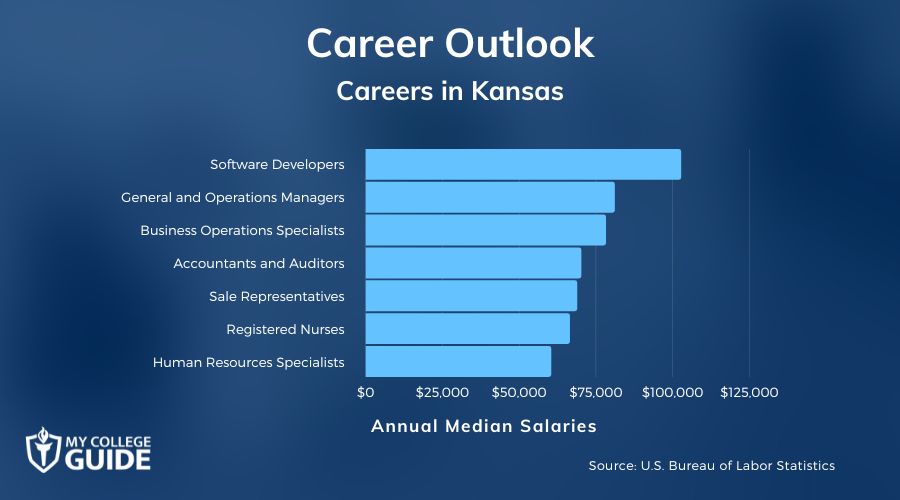
Many different jobs are available in Kansas. Business is a popular sector to work in. Organizations often offer positions for human resources specialists, accountants, auditors, and marketing analysts. Customer service representatives are common in this state too.
In Kansas, many organizations employ general and operations managers. Also, business executives depend on trained executive assistants. Another option is to work as a sales representative for a company. Wholesale and manufacturing sales jobs are fairly common, and selling services is another option.
Editorial Listing ShortCode:
Kansas’ children depend on teachers. Both elementary and secondary education jobs are available in this state. Healthcare services are also a need in Kansas, of course. One large job category is registered nursing.
Kansas City has multiple software companies, so there may be high-paying opportunities for software developers as well.
According to the Bureau of Labor Statistics, these are the average wages for some common jobs in Kansas.
| Careers | Annual Median Salaries |
| Software Developers | $102,690 |
| General and Operations Managers | $81,080 |
| Business Operations Specialists | $78,210 |
| Accountants and Auditors | $70,180 |
| Sale Representatives, Wholesale and Manufacturing, Except Technical and Scientific Products | $68,830 |
| Registered Nurses | $66,460 |
| Human Resources Specialists | $60,380 |
| Market Research Analysts and Marketing Specialists | $58,640 |
| Executive Secretaries and Executive Administrative Assistants | $53,160 |
| Customer Service Representatives | $35,460 |
These are just the average salaries for these positions. Specific wages are determined by factors such as location, experience, education, and job availability.
How to Know If an Online Degree Is Right for Me

Online college presents unique benefits and challenges, so it is important to consider whether it’s the right fit for you.
- Computer skills: Online classes necessitate the use of computers, virtual classroom platforms, and office applications.
- Full schedule: If traveling to and from campus for classes at set times won’t suit your busy schedule, you might be a good fit for online studies.
- School location: Online college may be an asset to you if you have your sights set on a school that’s far from your home.
- Self-discipline: To succeed with distance learning, it’s important to stay organized, check in with your classes regularly, and set aside time to get assignments done.
Some students appreciate hybrid programs with a mix of on-campus and online classes.
Choosing a Kansas Online College Program

Kansas has many online colleges, so it can be beneficial to compare a few options before enrolling.
- Academic programs: If there’s a particular major you’d like, you’ll need to search for a school that offers that program.
- Accreditation: Picking a regionally accredited school is important for many forms of financial aid, including federal aid, and helps to ensure that you’ll receive an education up to standards. Depending on your major, you might also want programmatic accreditation from an industry organization.
- Learning style: Online classes may have live components, or you may be able to do the work on your own schedule. Sometimes, you can even move through course modules at your own pace.
- Price: Tuition costs can vary widely depending on whether you’re attending a public or private school and whether you’re an in-state or out-of-state student. Financial aid can make a difference as well.
Admissions counselors can be an excellent resource and answer questions about these and other important factors as you’re exploring schools.
Should I Study in Kansas?

If you’re going to enroll in an online college, you may choose one from any state in the nation. Considering the following questions may help you decide whether or not to get your degree from an online university in Kansas.
- Are you a Kansas resident? In-state residents often save at certain Kansas schools, particularly community colleges and public universities.
- Are you an adult learner returning to the classroom? The Kansas Board of Regents’ Adult Higher Education Accessible Degrees program may be an asset to you.
- Do you hope to receive a Kansas-specific scholarship? The terms of the award may stipulate that you have to attend a college that’s based in Kansas.
- Does the degree require campus visits? Some online college programs have students come to campus now and then, so it would be convenient to attend a school near your home.
- Will you need Kansas licensure? If you plan to choose a job that involves licensure, such as teaching, a Kansas school may do the best job of preparing you to meet the state’s requirements.
Of course, you can also choose to study in Kansas simply because there’s a school that appeals to you there!
Kansas Online Colleges Admissions Requirements

To get into a school in Kansas, you’ll need to put together an application packet. The requirements vary among schools, but common admissions materials include:
- Essays, personal statements, or other writing samples
- High school transcripts, plus transcripts from any college programs you’ve been in
- Reference letters from teachers or bosses
- Test scores, such as the ACT or SAT (not needed at all schools)
While many colleges require a high school diploma, some Kansas schools may admit students who hold GED certificates or can pass skills tests.
Online Colleges in KS Accreditation
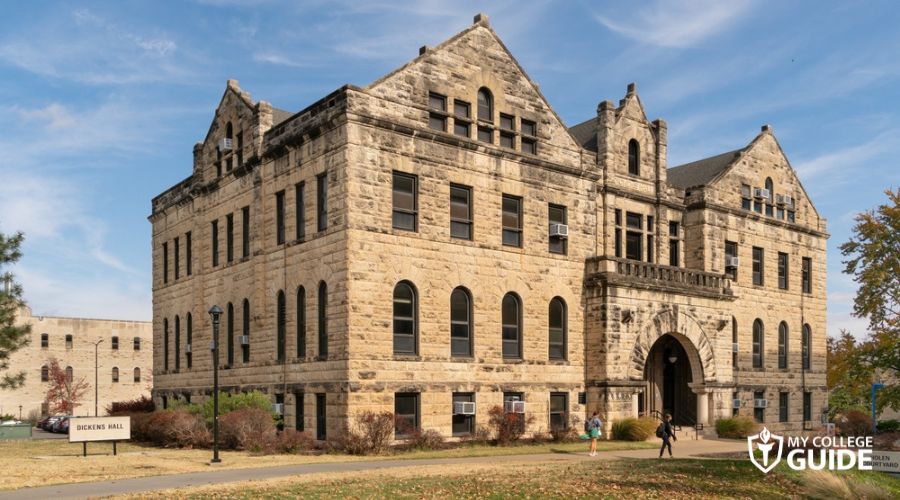
It’s beneficial to select a regionally accredited college for your studies because accredited schools have a proven track record of educating students effectively.
The regional accreditor that generally reviews and approves Kansas colleges is the Higher Learning Commission. Looking for a seal of approval from the HLC is a smart step whenever considering a college in Kansas.
Editorial Listing ShortCode:
Regionally accredited coursework is more likely to transfer between colleges or help you get into advanced programs after graduation. Regional accreditation can also be important for professional licensure, other work-related requirements, and financial aid.
Financial Aid and Scholarships

Often the first step to attending KS colleges online is filling out the Free Application for Federal Student Aid (FAFSA). This form will determine your eligibility and access to federal, state, and private financial aid.
Other forms of financial aid include grants and scholarships. These are typically most desired because they do not have to be repaid as long as they are used appropriately.
The Kansas Board of Regents administers the following financial aid programs for residents pursuing their undergraduate degrees to apply for.
- Kansas Career Technical Workforce Grant: Maximum of $1,000 per year
- Kansas Ethnic Minority Scholarship: Up to $1,850 annually
- Kansas Military Service Scholarship: Amount varies
- Kansas National Guard Educational Assistance Program: Amount varies
- Kansas Nursing Service Scholarship: Up to $2,500 per year for LPNs and up to $3,500 per year for RNs
- Kansas State Scholarship: Up to $1,000 annually
- Kansas Teacher Service Scholarship: Amount varies
Finally, most colleges and universities offer grants and scholarships available to their students exclusively. Some are awarded based on merit, some are need-based, and some are based on other criteria. You can ask the financial aid office at the school you plan to attend for additional information about financial aid.
Kansas Online Education Resources

Going back to college may seem like a big task at first, but these online resources can help make the process easier.
- Kansas Association of Community College Trustees: KACCT has details on enrolling in the state’s community colleges and also provides information about community college scholarship opportunities.
- Kansas Board of Regents: The state’s Board of Regents website offers information on adult education, articulation agreements, financial aid, and other college-related topics.
- State Library of Kansas: As you do research or other work for your online classes, you might appreciate the materials available through this library.
The college where you enroll may offer a variety of online resources too.
How Much Does It Cost to Go to an Online College in Kansas?

Prices usually differ between public and private colleges in Kansas. According to the National Center for Education Statistics, the average cost for in-state students at public schools is $9,081 a year. Out-of-state students pay on average $23,945 a year for those same schools.
For both groups, students who need room and board pay additional costs.
Whether in-state or out-of-state, students enrolled at private colleges pay on average $25,523 a year. Kansas’ 2 year schools, such as community colleges, often have the lowest costs. In-state students pay $3,648 a year on average, while out-of-state students pay on average $4,828.
Tuition Breaks for Out-of-State Students

While tuition is usually more affordable for in-state students, some out-of-state enrollees can get discounts too. The Midwestern Higher Education Compact (MHEC) offers a program called the Midwest Student Exchange Program (MSEP). Participating states offer tuition savings to students from other participating states.
In general, these discounts are associated with public universities. Students who take advantage of the MSEP will pay no more than 150% of the amount that in-state learners pay. Some private schools may offer a 10% discount to students who come from participating states.
Editorial Listing ShortCode:
The MSEP savings may be available for online students at certain schools. This varies among schools, and the Midwestern Higher Education Compact encourages contacting a school directly to learn more about whether online courses are eligible for the program.
What Jobs Are in High Demand in Kansas?

The Kansas Department of Labor provides information on what jobs are highly in demand in this state. Based on the agency’s data, some of the top job categories include:
- Accountants and auditors
- Elementary school teachers
- General and operations managers
- Registered nurses
- Software developers
Entry-level positions in these fields are most often given to college graduates. Kansas online degrees that could help prepare you for one of these in-demand careers include studies in business, accounting, education, nursing, or computer science.
What Are the High Paying Jobs in Kansas City?
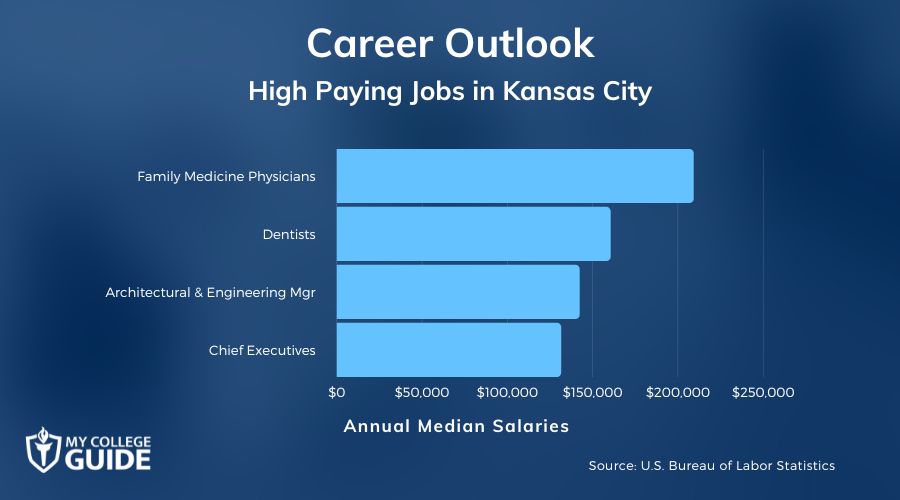
The Bureau of Labor Statistics provides data on the careers with the highest hourly wages in the Kansas City metropolitan area.
According to the BLS, these are some of the most lucrative careers and their annual median salaries.
- Family medicine physicians: $209,140
- Dentists: $160,470
- Architectural and Engineering Managers: $142,290
- Chief executives: $131,460
The above annual salary figures are derived from the average hourly wages in Kansas and calculated based on a full-time annual workload of 2,080 hours. Of course, personal salaries always vary based on factors like experience, education, and employer.
List of Online Colleges in Kansas
Methodology: The following school list is in alphabetical order. To be included, a college or university must be regionally accredited and offer degree programs online or in a hybrid format.

Baker University’s online degree programs employ a cohort model so that students keep the same classmates throughout their time in the program. Students can take fully online programs or choose a hybrid model.
The school offers associate, bachelor’s, master’s, and doctorate degrees. Students can choose from several fields of study, including business administration, special education, and leadership in higher education.
Baker University is accredited by the Higher Learning Commission.

Barclay College aims to provide its online students with a faith-based education full of the same academic rigor on-campus students can receive. Classes start every 6 weeks, giving students many opportunities to join. Courses are asynchronous with weekly assignments.
The school offers associate’s and bachelor’s degrees. Fields of study offered include criminal justice, Christian leadership, biblical studies, and nursing.
Barclay College is accredited by the Higher Learning Commission.

Benedictine College is a Catholic college dedicated to providing students with a quality education to prepare them academically and spiritually.
The school currently offers two master’s programs: an MBA and an MA in School Leadership (MASL). MBA students can attend courses through live video conferencing. MASL students become part of a cohort and attend classes virtually.
Benedictine College is accredited by the Higher Learning Commission.

Central Christian College of Kansas was named one of the top online colleges in Kansas by College Choice. The school provides students with a Christian, service-oriented education.
The school offers entirely online programs for associate and bachelor’s degrees. Most of these programs have 6 week courses and multiple start dates. Fields of study offered include criminal justice and healthcare administration.
Central Christian College of Kansas is accredited by the Higher Learning Commission of the North Central Association of Colleges and Schools.

Donnelly College is a small, private, Catholic college dedicated to helping students achieve their career goals while growing in their faith. While none of their programs are fully online, they do feature online components and evening classes for working students.
The school offers associate and bachelor’s degrees. Fields of study offered include nursing, information systems, and applied science.
Donnelly College is accredited by the Higher Learning Commission.

Emporia State University offers online and distance education programs for working students. Programs are either fully online or in a hybrid format. All courses are asynchronous with weekly assignments. Courses follow the school semester schedule.
The school offers undergraduate and graduate degrees in fields such as elementary education, accounting, art therapy, forensic science, and library science.
Emporia State University is accredited by the Higher Learning Commission.
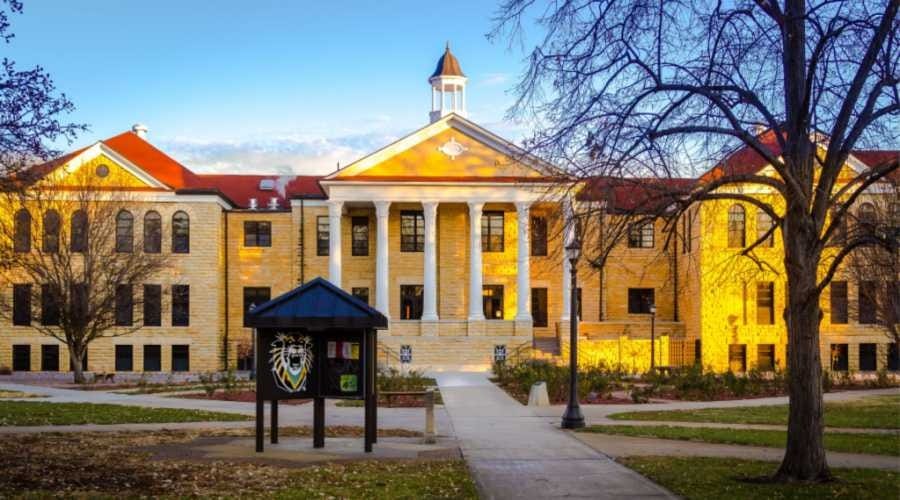
Fort Hays State University was named Best Online Program for Bachelor’s Degrees by U.S. News & World Report.
The school has offered distance education opportunities for over 100 years. It offers over 200 online and hybrid programs for associate and bachelor’s degrees in fields such as hospitality management and chemistry.
Fort Hays State University is accredited by the Higher Learning Commission.

U.S. News & World Report named Friends University as one of the best online colleges for both bachelor’s and graduate degrees. Students can choose between online or evening on-campus options to fit into their busy schedules.
Students can earn a bachelor’s degree or do a 4+1 degree to finish their master’s early. Fields of study offered include business and healthcare.
Friends University is accredited by the Higher Learning Commission.

Kansas State University has over 50 years of experience in distance education. Online students are taught by the same faculty as on-campus students. Courses are fully online and asynchronous, and online students pay the same tuition, regardless of residency.
The school offers associate, bachelor’s, master’s, and doctorate degrees in fields like aeronautics, dietetics, and mass communication.
Kansas State University is accredited by the Higher Learning Commission of the North Central Association of Colleges and Schools.

MidAmerica Nazarene University aims to provide students with an academically rigorous education with a Christian focus.
The school offers online programs for nontraditional students and distance learners. Most programs are fully online and feature both synchronous and asynchronous learning. The school offers undergraduate and graduate degrees in fields like computer information systems and healthcare administration.
MidAmerica Nazarene University is accredited by the Higher Learning Commission.

Newman University is a Catholic school ranked as one of the top colleges in America by Forbes. The school offers online programs designed for working adults. Programs are either entirely online or in a hybrid format. Courses follow regular semesters.
The school offers undergraduate and graduate degrees in fields like organizational leadership and theological studies.
Newman University is accredited by the Higher Learning Commission.

The Online Education Database named Ottawa University one of the Top 100 Best Online Universities. All programs are fully online and asynchronous. Courses are offered in an accelerated, 8 week format.
The school offers certificates and undergraduate and graduate degrees in fields such as human resources, elementary education, public safety, finance, and addiction counseling.
Ottawa University is accredited by the Higher Learning Commission.

Pittsburg State University aims to offer online degree programs that fit into students’ busy schedules. Programs are offered entirely online and do not require campus visits. Pitt State offers resources to help online students succeed.
The school offers associate, bachelor’s, master’s, and doctorate degrees in fields such as nursing, engineering, and physical education.
Pittsburg State University is accredited by the Higher Learning Commission of the North Central Association of Colleges and Schools.

Southwestern College is dedicated to giving its online students the same quality education as its on-campus students. All online classes are completely online, and most are asynchronous. SC offers eight start dates throughout the year, and online are courses 6 weeks long.
Students can choose from over 30 online graduate and undergraduate programs in fields such as accounting and special education.
Southwestern College is accredited by the Accrediting Commission for Community and Junior Colleges.

Sterling College is an entirely online college that aims to provide its students with a Christ-centered education. Academic years begin in August, and there are two start dates each semester.
Sterling offers seven fully online bachelor’s programs and two fully online graduate programs. Fields of study offered include history, Christian thought, sports ministry, and business administration.
Sterling College is accredited by the New England Commission of Higher Education.

Tabor College offers online degree programs designed for nontraditional and working students. Tabor currently only offers master’s degrees online.
Tabor offers three online master’s degrees: a Master’s of Business Administration, an MBA with a concentration in Sport Management, and an MEd in Neuroscience and Trauma. The programs require the completion of 30 to 36 credit hours, and classes are 7 to 8 weeks long.
Tabor College is accredited by the Higher Learning Commission.
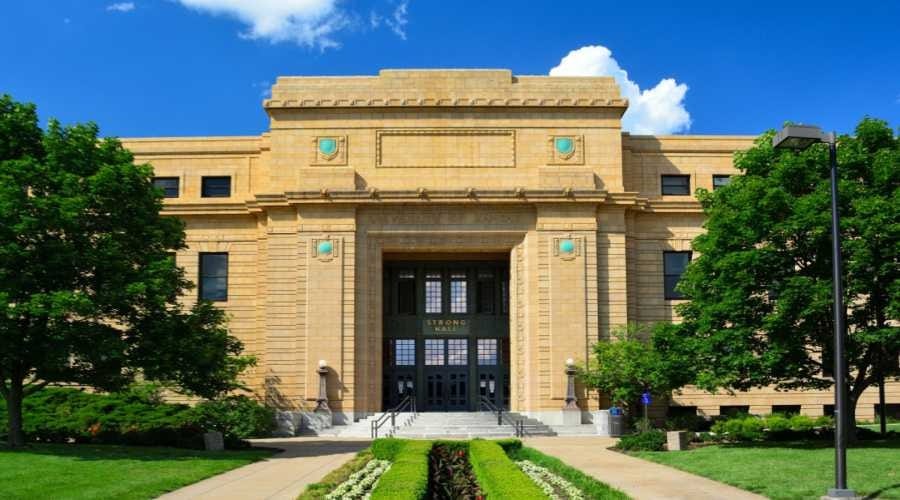
The University of Kansas offers over 80 online undergraduate, graduate, and certificate programs. All of these programs are fully online. Fields of study offered include communication studies, nursing, applied behavioral science, and civil engineering.
The University of Kansas is accredited by the Higher Learning Commission.

The University of Saint Mary is a Catholic school dedicated to providing students with academic and spiritual education. Programs are online, and some have optional practicum components.
USM offers undergraduate online degree programs in fields like cybersecurity, psychology, and exercise science. The school also offers a Master’s in Business Administration.
The University of Saint Mary is accredited by the Higher Learning Commission.

Washburn University offers a limited number of online programs for nontraditional students. Online students’ tuition is slightly cheaper because they do not pay activity fees.
Online students can choose from one of five degrees offered through the School of Applied Studies—Allied Health. Fields of study offered include health science, diagnostic medical sonography, and radiation therapy.
Washburn University is accredited by the Higher Learning Commission.
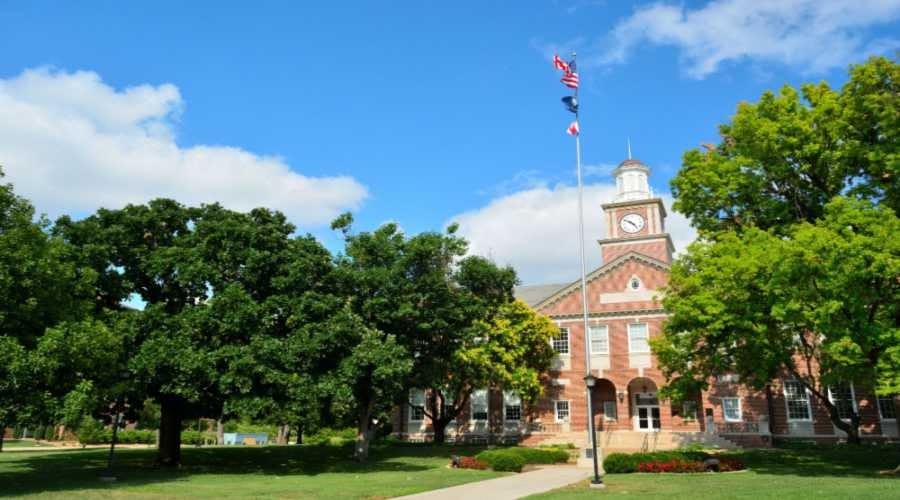
Wichita State University offers a variety of online undergraduate and graduate degree programs. Most of these programs are fully online. Courses follow the school’s semester schedule, and all students pay in-state tuition.
Fields of study offered include homeland security, dental hygiene, health administration, nursing education, and aging studies.
Wichita State University is accredited by the Higher Learning Commission of the North Central Association of Colleges and Schools.
Getting Your Online Degree in Kansas

Kansas is full of well-known colleges and universities, offering top-notch education both on campus and online.
The state’s Board of Regents continues to enact programs focused on improving the quality and accessibility of degree programs throughout the state, including KS online degrees. When it comes to higher education, Kansas has a lot to offer its students.
To start your journey, you can begin researching accredited schools in the state of Kansas and create a list of those that offer your degree program.
You can also view our Online Colleges in Iowa and Online Colleges in Kentucky guides for more options.
